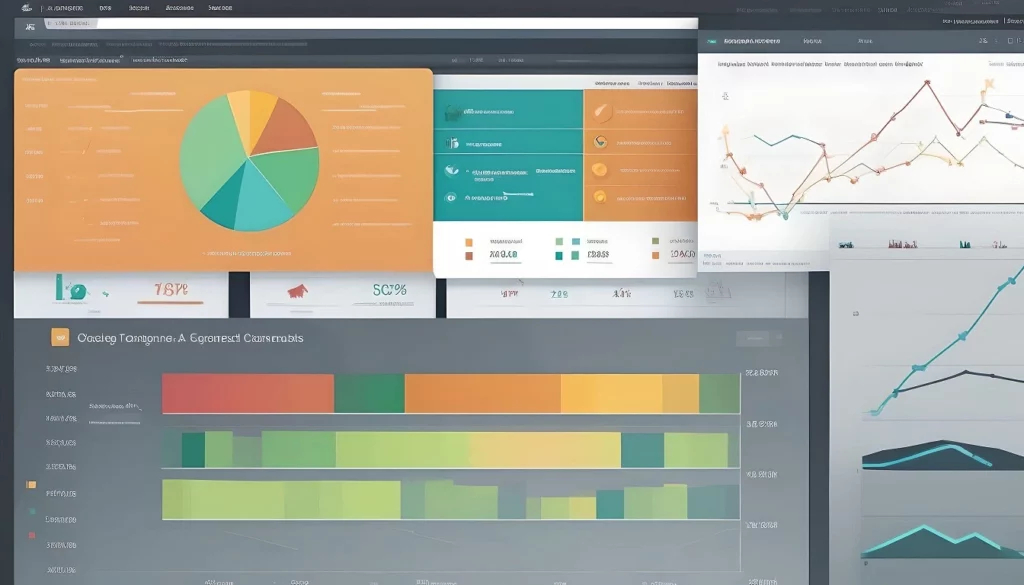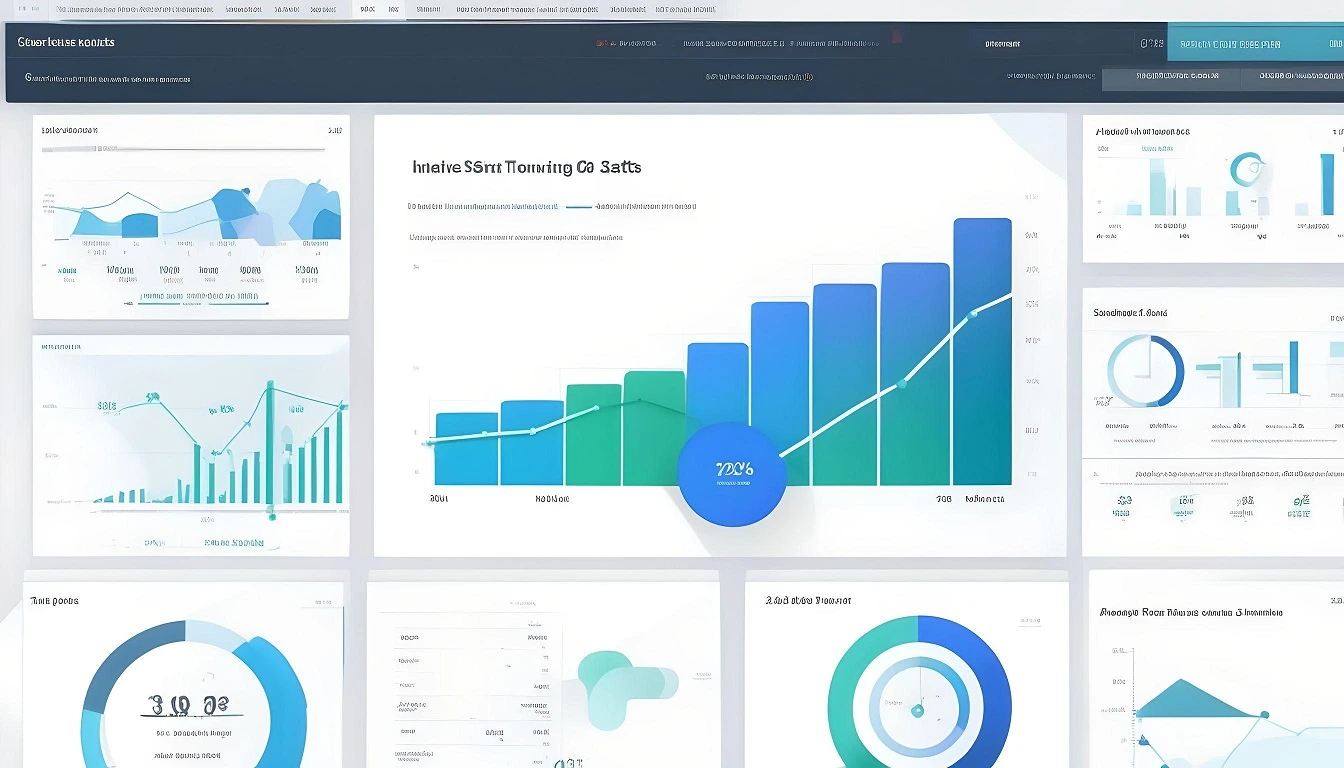We are about to enter 2024. Before 2023 ends, let’s review the top AI statistics and trends of the year.
Artificial intelligence (AI) has revolutionized numerous aspects of our lives, bringing forth advancements in technology across various applications. As AI continues to evolve, understanding the current AI trends and future projections is crucial for individuals and organizations to adapt and thrive in an AI-driven world.
2023 AI Statistics: The Rise of the AI Revolution
AI Market to Explode: 37% Annual Growth Expected
The global AI market is on fire, poised to grow at a staggering 37% annually until 2030. This exponential expansion underscores the technology’s burgeoning importance across all industries.
For businesses, embracing AI solutions presents a clear pathway to a competitive edge. AI-powered virtual assistants, for instance, offer enhanced efficiency and cost savings.
Individuals, too, stand to benefit from acquiring AI-related skills. Mastering AI systems, data analytics, and machine learning principles unlocks significant career advantages in the long run.
AI Automation: A Productivity Powerhouse
AI is more than just a buzzword. It’s here to stay, and its impact on productivity is undeniable. Over 40% of business leaders report significant gains in productivity thanks to AI automation.
By automating repetitive tasks, AI frees up your valuable time and energy for focusing on more complex and creative endeavors. Business leaders see immediate productivity boosts when adopting AI-driven automation. Employees who understand how to collaborate effectively with AI tools become indispensable assets to their organizations.
AI: Job Creator, Not Job Destroyer
Many fear that AI will disrupt the job market, but the AI statistics reveal the opposite: machine learning and AI technologies are poised to create over 133 million new jobs by 2030, spanning diverse fields like IT and retail.
For job seekers and professionals, developing AI literacy unlocks doors to exciting new career opportunities that didn’t exist before. Imagine teaching chatbots to be more engaging, thanks to advancements in AI and customer service!
AI’s $15 Trillion Economic Boost: A Smart Investment
These AI statistics leave no doubt: investing in machine learning is a profitable move. Business owners who want to stay ahead of the curve need to prioritize AI initiatives.
For individuals, understanding the implications of AI across industries – from agriculture to finance and manufacturing – equips you with valuable insights for making smarter career and investment decisions.
AI Website Builders Soar in Popularity: Up 50% in One Year
AI assistants have become integral to modern web design practices. From streamlining development to generating unique, SEO-friendly content, AI website builders have democratized web development. Searches for AI website builders in 2023 reached an all-time high, showcasing the continued growth of AI-driven innovation in this field.
Read also: 53 Solid Uses of Artificial Intelligence in 2024
AI Adoption: Embracing Efficiency and Innovation
Leading businesses are increasingly adopting AI to unlock its potential for boosting efficiency, solving complex problems, and enhancing customer experience. Let’s delve into five revealing AI statistics that paint a picture of the global AI adoption landscape:
- China and India Lead the Way in Deployed AI Adoption: With over 40% of businesses in these regions utilizing AI, it’s clear that they are at the forefront of leveraging AI for innovation and efficiency. This presents a competitive advantage for companies operating or considering expansion in these markets, while also highlighting potential career opportunities for professionals with AI expertise.
- AI Offers a Solution to Labor Shortages: As labor shortages pose a significant challenge to businesses, 25% of companies are turning to AI to address this issue. From automating mundane tasks to using predictive hiring strategies, AI offers a viable solution for managing workforce gaps. This trend suggests that the future work environment will increasingly involve AI, making basic AI literacy a valuable asset for individuals.
- Automation Drives IT Efficiency: A staggering 33% of all AI adoption cases focus on automating IT processes, simplifying tasks like data management and cybersecurity. While this signals a shift in job roles and responsibilities within IT, it also emphasizes the importance for IT professionals to stay updated with these automated processes to ensure career longevity.
AI Investment: A Flourishing Landscape
Attracting massive financial investments, AI has become a major driver of economic activity. Understanding this investment landscape is crucial for stakeholders, entrepreneurs, and professionals alike. Here are three key AI statistics shedding light on AI funding trends:
- Global AI Funding Surges to $45 Billion: This significant amount demonstrates the growing market confidence in AI technology. For business owners, it signifies a fertile ground for investing in AI innovation, while for professionals working in this space, it translates to job security and ample opportunities for career growth.
- US and China Dominate AI Investment: The bulk of AI investments are concentrated in these two global powers, highlighting their market maturity and resources for AI development. For businesses seeking to launch or invest in AI projects, focusing on these countries can offer strategic advantages. Additionally, individuals seeking AI-related jobs should note that the US and China will be hubs for research, development, and application opportunities.
- AI Startup Funding Skyrockets: The dramatic 66% increase in AI startup funding between 2021 and 2023 showcases the rapid pace of innovation and market demand. This trend presents a conducive environment for aspiring entrepreneurs to launch new ventures in the AI space. For investors, the surge in funding indicates a potentially lucrative market, but careful evaluation of the technology is crucial for making wise investment decisions.
AI Jobs: A Burgeoning Market with High Demand
As artificial intelligence (AI) becomes increasingly integrated into various industries, the need for skilled professionals in this field is soaring. Here are three key AI statistics that highlight the growing demand for AI talent and its implications for employment and skill development:
- AI Skills Shortage Widens: The demand for AI skills far exceeds the current supply of qualified professionals. This presents a challenge for businesses, as attracting and retaining AI-skilled workers becomes increasingly competitive. For individuals, this skills gap translates to a lucrative opportunity. Acquiring expertise in AI can lead to job security, career advancement, and potentially higher earning potential.
- AI Expertise Commands Premium Salaries: The average salary for AI professionals is a staggering $160,000, demonstrating the value that businesses place on these specialized skills. This statistic further emphasizes the potential benefits of upskilling or reskilling in AI technologies, offering individuals a path towards higher income and career growth.
- Automation Reshapes the Workforce: By 2030, AI is projected to automate 30% of work hours across the US economy. While this might raise concerns, it’s important to note that AI primarily automates routine and repetitive tasks. This frees up valuable time and resources for employees to focus on more creative, strategic, and human-centric tasks, ultimately leading to a better allocation of resources and improved overall efficiency.
AI’s Impact on Automation: Revolutionizing Industries and Redefining Work
The capabilities of AI to optimize processes, enhance customer experience, boost efficiency, and provide valuable insights have made it a game-changer across various industries. Here are three AI statistics that showcase the current and future impact of AI in automation:
- Generative AI: New Horizons Emerge: Over 95% of executives believe that generative AI will revolutionize the way we use and apply AI technology. This emerging field extends beyond simple data analysis, enabling data generation and simulations for diverse applications. Companies should consider how generative AI can be employed in their operations and strategies, across areas like product design, supply chain management, and customer engagement.
- AI Transforms Data-Driven Industries: Banking, financial services, insurance, and healthcare sectors currently claim the largest share of the AI market. This highlights the significant impact AI has in data-intensive and highly regulated industries. Businesses in these sectors leverage AI to gain a competitive edge and enhance operational efficiency while complying with regulations. For individuals seeking career advancement or specialization, these sectors offer promising opportunities for AI-related roles.
- US Leads in Industrial AI Automation: American companies dominate the industrial AI automation landscape, indicating the country’s thriving innovation ecosystem and supportive policies. This is particularly relevant for investors interested in American AI ventures and job seekers who view the US as a lucrative market for AI-related careers. These AI statistics encourage entrepreneurs to embrace AI automation within their organizations to gain a competitive edge and thrive in an evolving market.
NLP: Revolutionizing the Way We Interact with Technology
Natural Language Processing (NLP) is a transformative technology that empowers computers to understand, interpret, and utilize human language. From AI-powered voice assistants and smart speakers to advanced text analytics, NLP applications are rapidly expanding across diverse sectors. The following AI statistics shed light on the impressive growth and implications of this groundbreaking technology:
- NLP Market poised for Explosive Growth: The NLP market is expected to exceed $40 billion by 2025, representing a staggering 14-fold increase since 2017. This projected growth underscores the widespread adoption of NLP across industries, from retail and healthcare to finance and education. Businesses have a unique opportunity to gain a competitive edge by investing in NLP technologies and integrating them into their operations.
- Smart Speakers: A Testimonial to NLP’s Consumer Acceptance: The smart speaker market, a segment heavily reliant on NLP, is projected to reach $26 billion by 2027. Popular AI voice assistants like Siri and Alexa, coupled with smart speakers like Google Home, have become household names, demonstrating widespread user acceptance and reliance on NLP technology for tasks ranging from setting reminders to controlling home automation.
- A Thriving Ecosystem of NLP Developers: Over 1800 NLP companies worldwide, ranging from startups to established players in the software industry, are actively developing and implementing NLP solutions in various projects. This includes business productivity tools, data analytics platforms, and AI-powered telecommunication services. The sheer number of companies engaged in NLP development underscores the diverse and competitive nature of the landscape, offering businesses a plethora of options for tailoring NLP solutions to their specific needs.
- NLP Skills: A High-Demand Commodity in the Job Market: NLP expertise is one of the most sought-after skills in today’s job market. This demand reflects the widespread application of NLP across industries and its critical role in driving innovation and efficiency. Professionals have an immediate opportunity to upskill and gain valuable NLP expertise, making them more marketable and versatile in a rapidly evolving workforce.
Ethical Considerations and the Need for Regulation
While AI offers tremendous potential, concerns regarding bias, ethics, and the need for regulatory oversight are becoming increasingly prevalent. From biased algorithms impacting the hiring process to underrepresentation in research, ensuring ethical AI development is critical. Here are some AI statistics highlighting these issues:
- Public Concern Over AI Bias: Over 60% of Americans are concerned about AI bias and potential discrimination during the hiring process. This statistic reflects a growing public awareness and concern regarding the ethical implications of AI. Policymakers and companies are under pressure to develop robust AI regulations and guidelines to ensure equitable AI practices and mitigate potential bias.
- Bias in Healthcare AI: A recent study revealed that a healthcare algorithm was less likely to recommend necessary medical treatment to Black patients. This alarming case highlights the potentially life-threatening consequences of biased AI applications in healthcare settings. Healthcare providers should not solely rely on AI tools but must exercise caution and ensure fair and equitable treatment for all patients.
- Diversity in AI Research: Women represent only 11% of global AI research publications. This lack of diversity in AI research can perpetuate biases and limit the technology’s applicability to diverse populations. Academia and the tech industry need to foster more inclusive environments to encourage participation from underrepresented groups and develop more comprehensive and equitable AI solutions.
AI’s Impending Rise: Transforming Businesses and Lives

The business world is poised for a significant shift towards a more defined AI strategy within the next five years. As we look ahead, businesses and individuals alike must prepare for a landscape where artificial intelligence plays an increasingly pivotal role. The following AI statistics shed light on the exciting future of AI trends:
- A Booming AI Industry: With an anticipated market value of $190 billion by 2030, the AI industry is expected to permeate diverse sectors. This translates to a future where businesses, regardless of size or industry, need to actively consider integrating AI into their operations and strategic plans. For individuals, it emphasizes the growing importance of understanding AI principles in everyday life and professional pursuits.
- AI-Driven Job Growth: Contrary to popular concerns, AI adoption and increased digital access are projected to drive job growth in over 50% of surveyed businesses. This suggests that AI should be embraced by companies and employees not just as a tool for efficiency, but also as a powerful force for job creation and economic growth.
- Investing in AI Skills: The increasing prevalence of AI underscores the critical need for skills related to its adoption and utilization. Recognizing this, 50% of surveyed companies are planning to invest in on-the-job and internal training programs focused on AI. This highlights a shift towards upskilling the workforce for the future. Individuals have an opportunity to proactively engage in lifelong learning, enhancing their employability and securing their career prospects in an AI-driven world.
AI’s Global Impact: Business Adoption, Marketing Trends, and Consumer Opinions
- 35% of companies worldwide are actively using artificial intelligence. This demonstrates the increasing adoption of AI across industries and highlights the competitive advantage it offers.
- 66% of businesses are planning or already using AI for their sustainability goals. This highlights the role AI can play in addressing environmental challenges and driving sustainable practices.
- The global market revenue for AI in marketing is predicted to reach $107 billion by 2028. This underscores the significant growth potential of AI in marketing and its ability to revolutionize how businesses connect with customers.
- 90% of marketers across 35 countries used AI to automate customer interactions. This showcases the widespread adoption of AI for automating customer service and enhancing the customer experience.
- The global ChatBot market is expected to reach $1.25 billion by 2025. This emphasizes the growing popularity of ChatBots and their potential to personalize customer interactions and streamline business processes.
- Over 80% of marketers plan to integrate AI into their online marketing activities in the coming years. This trend indicates a significant shift towards AI-driven marketing strategies.
- 55% of companies in the US agree that integrating ChatBots with customer service helps generate new leads. This highlights the effectiveness of ChatBots in lead generation and driving business growth.
Ethical Concerns and the Future of AI Integration
- 50% of consumers in the US believe that generative AI like Photoshop should not be used for commercial purposes. This raises ethical concerns regarding the use of AI technology and the potential for manipulation.
- 47% of companies in select countries trust AI integration with ad targeting. This demonstrates the growing trust in AI for advertising purposes, although ethical considerations remain.
- The worldwide AI market is expected to reach $1.59 trillion by 2030, growing at a CAGR of 37%. This signifies the immense potential of the AI market and its expected exponential growth.
- AI is projected to contribute a 26% increase in global GDP by 2030. This highlights the significant economic impact of AI and its potential to drive economic growth.
- 61% of employees believe AI helps improve productivity, with a projected 40% increase in employee productivity. This demonstrates the positive impact of AI on workplace efficiency and individual performance.
AI and the Competitive Landscape
- Top-performing companies are 2 times more likely to implement AI for marketing. This underscores the strategic advantage offered by AI for achieving business success.
- 70% of top-performing marketers have a defined AI strategy. This highlights the importance of having a clear roadmap for AI implementation to maximize its benefits.
- Artificial intelligence has grown by 300% worldwide over the past five years. This demonstrates the rapid pace of AI development and its increasing adoption across various sectors.
- B2B marketers primarily use ChatBots for audience insights (57%), generating new leads (55%), and educating potential customers (43%). This showcases the versatility of ChatBots in marketing strategies.
- Only 28% of people trust AI completely as of 2022. This highlights the need for transparency and ethical considerations in AI development to build trust with the public.
- The US is the leading investor in AI technology, with $47.4 billion invested as of 2022. This underscores the US’s commitment to AI innovation and its potential to drive economic growth.
Global AI Trends and Future Predictions (continued):
- 100 million people are expected to work in the AI industry by 2025, highlighting the significant job creation potential of this emerging field.
- 80% of HR professionals reported positive attitudes towards AI technology within the HR industry. This indicates the growing acceptance of AI in human resource management and its potential to improve HR processes.
- The autonomous vehicle industry is expected to reach $667.7 billion by 2026, showcasing the rapid growth and potential of self-driving technology.
- 57% of B2B marketers used ChatBots for demand generation in 2022, emphasizing the effectiveness of ChatBots in lead generation and customer acquisition.
- Around the world, 77% of devices already use at least one AI feature, demonstrating the widespread integration of AI into everyday technology.
- 92.1% of companies reported positive results after implementing AI technology in their business processes, highlighting its effectiveness in driving business improvements.
- As of 2022, 2.05% of job postings in the US required AI-related skills, indicating the growing demand for skilled AI professionals.
- Experts estimate that 60% of currently employed workers in AI-related jobs didn’t exist 80 years ago, showcasing the rapid evolution of the job market and the emergence of new AI-driven roles.
AI in Specific Sectors:
- Machine learning grew by 48% in the automotive sector worldwide in 2023, highlighting the rapid adoption of AI in this industry.
- Every day, Google processes over 6.9 billion searches related to global AI technologies, demonstrating the increasing public interest in AI and its potential applications.
- 9% of businesses worldwide have been replaced by AI tools, reflecting the impact of automation on the job market.
- Intelligent robots are estimated to replace 30% of the global workforce by 2030, prompting discussions about the future of work and the need for reskilling initiatives.
- 20 million manufacturing jobs could be lost due to automation by 2030, highlighting the potential impact of AI on specific industries.
Read also: Is there AI that can Make Charts and Graphs?
Conclusion
These AI statistics offer a comprehensive overview of the current state and future trajectory of AI technology. As AI continues to evolve and permeate diverse sectors, it is crucial to remain informed about its advancements and implications. By understanding the AI trends, challenges, and opportunities associated with AI, individuals and organizations can make informed decisions and prepare for the transformative future that lies ahead.
Summary
|
Category |
AI Statistic |
| AI Adoption and Market Growth | The global AI market is expected to reach $1.59 trillion by 2030, at a CAGR of 37%. |
| 92% of leading organizations are investing in AI activities. | |
| 91% of companies say that their investment in data and AI activities is increasing year-on-year. | |
| The global AI adoption rate was 35% in 2022, up 4 percentage points from the previous year. | |
| AI Jobs and Skills | The demand for AI skills is outpacing the supply of AI talent. |
| The average salary for AI professionals is $160,000. | |
| 30% of work hours across the US economy could be automated with AI by 2030. | |
| 61% of employees state that AI aids in improving productivity, with 40% expected employee productivity rate. | |
| AI in Businesses and Industries | Over 95% of executives agree that generative AI will revolutionize where and how AI is used. |
| Banking, financial services, insurance, and healthcare sectors have the biggest AI market share. | |
| 66% of businesses are planning or using AI for their sustainability goals. | |
| Top-performing companies are 2 times more likely to implement AI for marketing. | |
| 70% of top-performing marketers have a defined AI strategy. | |
| 50% of marketers are concerned about data privacy and ethics implemented with AI. | |
| Consumer Perception and Ethics | Only 28% of people entirely trust AI as of 2022. |
| 50% of consumers in the US believe that generative AI like Photoshop should not be used for commercial purposes. | |
| 47% of companies in selected countries trust AI integration with ad targeting. | |
| 64% of consumers are ready to submit their personal data to AI to improve the overall experience. | |
| The Future of AI and its Impact | 100 million people will work in the AI industry by 2025. |
| 80% of the HR workforce reported positive attitudes towards AI technology related to the HR industry. | |
| 20 million jobs related to the manufacturing industry could be lost because of automation by 2030. | |
| Intelligent robots will replace 30% of the global workforce by 2030. | |
| AI is projected to contribute a 26% increase in global GDP by 2030. |







